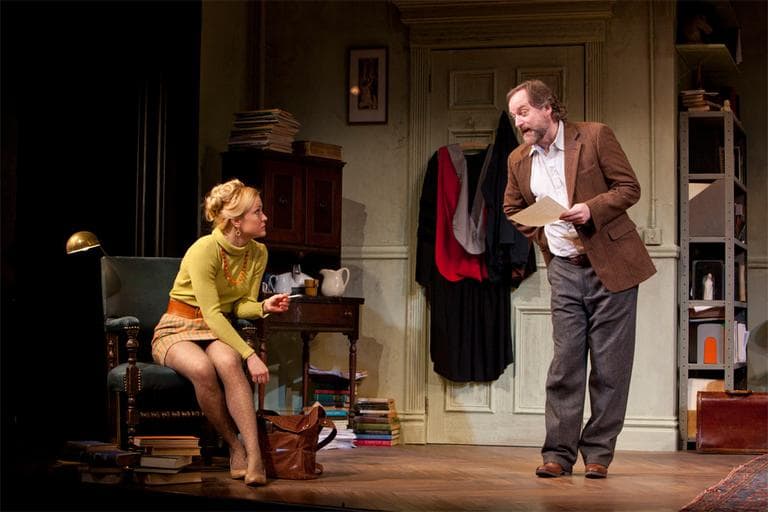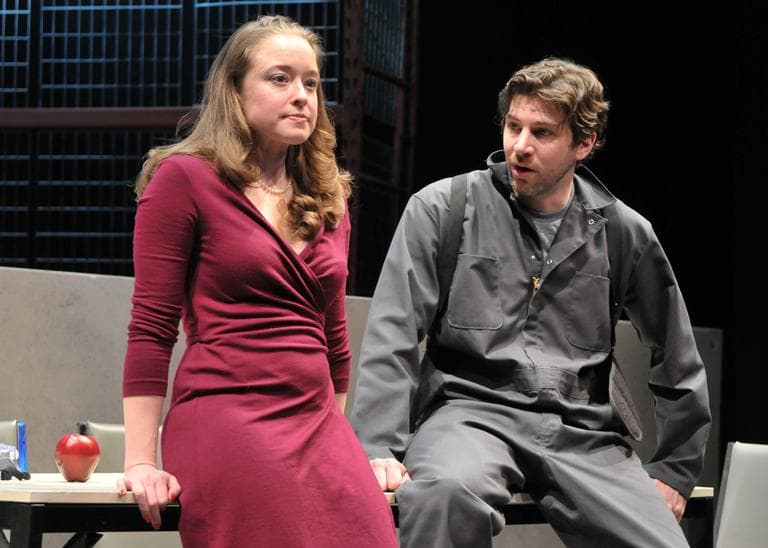Advertisement
After Plateau, This Could Be Boston's Golden Age Of Theater
ResumeYou could be forgiven for thinking that the artistic level of Boston theater had plateaued a couple of years ago. For all the good work being done, there was a certain level of predictability about area stages.
Whatever one thinks about the new kids on the block – the American Repertory Theater under Diane Paulus and ArtsEmerson under Rob Orchard, predictable they are not. Prolific is more like it, particularly since both are staging four high-profile events this month, along with attendant corollary performances and screenings. The ART has had “Ajax,” “Prometheus Bound,’’ and “Death and the Powers,” while Paulus’s spectacular Public Theater production of “Hair” is at the Colonial Theatre.
ArtsEmerson, meanwhile, has hosted “The Select” (“The Sun Also Rises’’) and is now showing two Peter Brook performances, “The Grand Inquisitor’’ and Samuel Beckett’s “Fragments’’; before closing the month with F. Murray Abraham in “The Merchant of Venice,” which Charles Isherwood raved about in the New York Times.
Add in some very impressive work on other local stages and forget that plateau. This is as good as it’s been in local theater since Boston was a tryout town for Broadway-bound plays. (Better, in my opinion, since there’s a greater variety of smaller theater offerings.)
If you’re looking for the golden age of Boston theater, you might just be in it.
ART

Given the background of Paulus and Orchard this explosion of activity might almost seem like a competition. Paulus was brought in last season to succeed Robert Woodruff as artistic director and the appointment ultimately dissolved the troika that ran ART, including Gideon Lester and Orchard, who was the head man (and had been at ART since its inception). It also left a number of ART regulars disgruntled, particularly since there was seemingly no room in the remodeled inn for such stalwart members of the acting company as Karen MacDonald and Will LeBow, two of the area’s best actors. LeBow posted an angry denunciation of Paulus online.
Woodruff, who was founder Robert Brustein’s successor, was a great director and ART became a critics’ favorite – myself included – but Harvard, which runs the place, seemingly felt that Woodruff’s harsh aesthetic produced too many empty seats and left too large a deficit. (Harvard never did talk about the firing.)
Paulus has a much more populist approach than Woodruff’s, which is not the same as giving the people what they want. At its best under Paulus, the ART has been the model of a 21st century arts organization, stretching the bounds of theater, particularly “Sleep No More,” a brilliant mashup of Shakespeare’s “Macbeth” and Hitchcock’s “Rebecca’’ set in a vacant Brookline school. At its worst, as in “Best of Both Worlds,” a gospel version of “The Winter’s Tale,” the work can be artistically paltry.
But she is a superlative director in her own right, as evidenced by the production of “Hair” at the Colonial (through April 10), as well as the ongoing “Donkey Show” at Oberon. Her ability to marshal large forces is reminiscent of the talent of former Huntington artistic director Nicholas Martin and the jolt of energy she brings to all her projects adds a little rock ‘n’ roll to the scene.
“Hair” has never been my favorite musical, but Paulus and choreographer Karole Armitage literally had me dancing in the aisles (I’m no idiot; when a beautiful actress asks me to dance, I know what the answer is.) That aside, what’s most impressive about “Hair” is Paulus’s ability to evoke the 1960s without getting either overly nostalgic or satirical. The excellent touring cast takes the time and the characters seriously, which is harder to do than it might seem, given the cynicism toward the Age of Aquarius that courses through today’s culture.
If the musical itself could use a little more story to go with the well-turned anthems, that doesn’t detract from the overall success of the production, which symbolizes Paulus’s attempts to make the audience feel fully invested in what’s going on in front of them.
There’s a palpable sense when you enter their theaters that something special, potentially transformative, is about to happen.
On the ART front, this month’s offerings, “Ajax” on the Loeb Center mainstage (now closed), “Prometheus Bound,” and “Death and the Powers: The Robots’ Opera” – even if not fully satisfactory — are all imaginative, ambitious and provocative. Director Sarah Benson and translator Charles Connaghan made Sophocles’ “Ajax” as relevant to the wars in Afghanistan and Iraq as if they were written today.
Paulus, who directed “Prometheus” (at Oberon through April 2) and Steven Sater (“Spring Awakening”), who wrote the excellent script and lyrics, turn Aeschylus’s tragedy into the story of prisoners of conscience everywhere, though one can’t help but applying it more specifically to what’s happening in the Middle East right now. The stagecraft is first-rate. Paulus uses the Oberon space much as she has with “The Donkey Show” – to suffuse the play with the energy of a rock concert. “Hair” meets Greek tragedy.
It’s not as successful in “Prometheus,’’ partly because the music by Serj Tankian (System of a Down) is too generic (anthems and power ballads that even the wonderful Lea Delaria can’t turn into anything special) and partly because there’s a been-there-danced-on-that-table aspect to the staging. What seemed so fresh in “The Donkey Show” (which is also still running) is starting to feel a little old already. As with that show, you’re free to sit upstairs on the sidelines where the voluptuous daughters of the Aether roam about, or stand/dance with the groundlings in the mosh pit down below where Prometheus has been chained by the minions of Zeus for giving fire to the humans.
I opted to consort with the Aether babes, but I have to say I was distracted by the fact that the head-bobbing, fist-pumping younger members of the audience were almost as carried away by the fascistic nastiness of Hermes as they were by Prometheus’s call to conscience in his final song. If Prometheus eventually wins hearts and minds, it’s only because Tankian gave him more powerful music. (The song’s lyrics were pretty much indecipherable in an otherwise exemplary sound mix.) My guess is, since I doubt that the fist pumpers could make out the words, either, they would have been equally ecstatic if Prometheus had been singing Borat’s “Throw the Jew Down the Well.” As with “Ajax,’’ the production values can overwhelm the humanism of the script.
Still, Paulus makes it clear that “Prometheus Bound” is on the side of the angels. Performances end with a salute, in collaboration with Amnesty International and local activists, to prisoners of conscience throughout the world.
And there’s no doubting what a gifted director Paulus is, whether she’s inviting the audience into the center of her productions (and those of many other plays at ART) or making imaginative, often startling, kinetic connections between actors and material. Take “Death and the Powers” (at the Cutler Majestic, through March 25), a complex story about a dying tycoon’s efforts to live forever digital, with robots developed at MIT’s Media Lab buzzing about the stage, backlit by a computerized light show. It’s the kind of work I hope we see more of.
Which doesn’t mean that it’s a great success. Tod Machover’s music and Robert Pinsky’s libretto are engaging, but only in fits and starts (don’t buy me the CD for Christmas). The story by Pinsky and Randy Weiner reminded me of ‘50s sci-fi movies like “Donovan’s Brain,” with a political add-on that capitalizes, a bit clumsily, on recent global financial shenanigans. And like most of those earlier sci-fi films, the story is incredibly predictable about how superior human (analog?) life is to the digital version.
Still, the singing is exquisite, particularly by Sara Heaton as Miranda, daughter to the tycoon, Simon Powers. He, unfortunately, is no Prospero, though James Maddalena is great as always. And reservations aside, “Ajax,” “Death and the Powers,” and “Prometheus” are emblematic, along with “Hair,” of the admirable sense of new energy that Paulus has brought to the area
ArtsEmerson

If Paulus was last year’s story then Orchard is this year’s, having put together a phenomenal lineup of international artists, mostly from theater, to grace the stages of the newly refurbished Paramount Center, along with other venues. There’s only been one clunker – “The Color of Rose,’’ a world premiere play about Rose Kennedy – in a season that has featured transcendent performances by the Abbey and Druid Theatres as well as a fair amount of fun (particularly “Fraulein Maria,’’ a frolic through “The Sound of Music.’’)
This month Orchard will have brought back the Elevator Repair Service (“Gatz”) to reimagine “The Sun Also Rises” in “The Select” (March 15-20); Peter Brook’s production of Beckett short plays, “Fragments’’ (March 23-30); Brook’s adaptation of Dostoevsky’s “The Grand Inquisitor’’ (March 24-30); and “The Merchant of Venice” (March 29-April 10 at the Cutler Majestic).
Theatre for a New Audience’s “The Merchant of Venice” is not only the best version of the play I’ve seen — and that’s saying something given Shakespeare & Company’s great version at the Mount some 10 years or so ago — it’s one of the best Shakespeare productions I’ve seen.
Director Darko Trensnjak frames the action in contemporary times, complete with computers, flat screens, cellphones, Starbucks coffee and even a hip-hop anti-Semite. All this can often be the sign of a desperate attempt to make Shakespeare relevant, but Trensnjak backs up all his choices and F. Murray Abraham and the rest of this astoundingly good cast make every word as crisp and clear as if it had been written today.
Not unlike other post-World War II productions, this one casts Shylock, the Jewish moneylender, as more sinned against than sinning and it shows that the quality of mercy that Portia says is missing from Shylock is missing in even greater measure in the Christian characters’ makeup. Shakespeare wasn’t free of the anti-Semitism of his time, but his genius was in creating characters who were neither all good nor all evil, and this “Merchant of Venice’’ presents that ambiguity in all its glory.
This is the kind of world-class programming that Boston has needed for decades, particularly with the commercial scene now so reliant on hit musicals. Unfortunately, an attempt by Emerson (not ArtsEmerson, specifically) to program the Colonial Theatre with Broadway and Off-Broadway plays fell through and it now appears that jewel of a theater will be going dark next season, at least temporarily.
I might be in the minority, but I would put the Brook programs in the same starry category as the Irish plays, even though Bruce Myers lived out the actors’ nightmare and had to be prompted for a high percentage of his lines on opening night of “The Grand Inquisitor,” Dostoevsky’s chapter in “The Brothers Karamazov” about Christ coming back to earth, only to be re-sentenced to death by the Catholic Church. Why? For overrating the human species’ willingness to embrace freedom and love when what they really wanted was authoritarianism. Marie Helene Estienne’s adaptation, Brook’s direction and Myers’ resigned delivery brought Dostoevsky’s genius and contemporary relevance bone-chillingly alive, though undercut by the discomfort of empathizing with Myers’ problems.
One hopes this was a one-time glitch for Myers, whose problems were blamed on jet lag, because when he was on he delivered his lines with the quiet authority that Brook actors are known for – a gesture here, a quiet rejoinder there, which speak louder than the most stentorian actor’s bombast.
He had only a minor glitch or two when he joined Yoshi Oida and Hayley Carmichael for Beckett’s “Fragments.” (Both productions are only an hour, but they’re separate admissions.) These are five wonderfully realized pieces by a playwright whose taste for the vaudeville is rarely captured as well as it is here. Which doesn’t mean that Brook and codirector Estienne don’t also capture the fact that these mostly nameless characters are also staring into an abyss of routine and meaninglessness. The trick to Beckett is that one realizes that sadness, but still can kick up one’s heels like Keaton and Chaplin and move on down the road. Ultimately, Brook’s company takes the formidable giants, Dostoevsky and Beckett, and makes them a couple of guys you’d want to have an existential beer with.
“The Select,” on the other hand, was not as successful in telling Hemingway’s “The Sun Also Rises” as it was with Fitzgerald’s “The Great Gatsby.’’ This is not a word-for-word transfer of the novel, though at over three hours it feels like it. Underlying the humor, there’s a sadness to Hemingway and Fitzgerald that “The Select,” unlike “Gatz,” never articulates.
On another note, ArtsEmerson helped develop this project through its residency program. Next season, Orchard plans to be developing more and presenting a little less.
Educating Rita

One thing that Paulus and Orchard have both succeeded at is making almost each of their offerings a real event. There’s a palpable sense when you enter their theaters that something special, potentially transformative, is about to happen.
For all that, the single most impressive “event” of the season has been last fall’s “The Shirley, Vt. Plays,” a collaboration among three theaters – the Huntington Theatre Company, SpeakEasy Stage Company, and Company One, exposing Boston audiences to a major young playwright, Annie Baker, in a way that put her work into perspective and simultaneously showcased the growing acting and directing talent in the area. Peter DuBois, the artistic director of the Huntington, spearheaded the idea of doing the plays together, the best thing he’s done at the theater since taking over three years ago.
“Educating Rita” (through April 10) is not one of the best ideas he’s had. Willy Russell’s 1980 play from which the Michael Caine-Julie Walters film was made, is a perfectly pleasant, and perfectly predictable, English comedy about university educations and class conflict. It’s somewhat of an update of Bernard Shaw’s “Pygmalion,” in which a young woman asks an intellectual – a boozy English professor in this case – to upgrade her book-learning.
But Shaw didn’t indulge in the sentimentality of thinking that the poor and uneducated were somehow closer to basic truths than their counterparts or that a little exposure to literature and middle-class living would corrupt their souls. Jane Pfitsch’s Rita, named after Rita Mae Brown, could almost convince you that she’s on to something out of the ordinary, but Russell’s writing – Rita suggests that E.M. Forster’s “only connect” was the sign of a frustrated electrician – isn’t good enough.
reasons to be pretty

SpeakEasy has been particularly sharp the last few years, as is evidenced at the moment by the company’s continued championing of controversial playwright Neil LaBute, whose “reasons to be pretty’’ is getting a rousing production (through April 2) at the Boston Center for the Arts.
As the play opens, things have already spun out of control as Steph throws everything but the appliances at her boyfriend, Greg, after learning that he described her face as “regular.’’ This is LaBute’s third lapel-grabbing play about America’s obsessiveness with physical appearance and he couldn’t ask for much more than director Paul Melone, the four actors and all the designers give him at the Roberts Theatre. (Burt Grinstead as the working class anti-hero, Kent, is particularly riveting; Angie Jepson’s self-righteous pouting is a little too strident.)
“Reasons to be pretty” doesn’t have the shock value of “The Shape of Things” or “Fat Pig,” the other two parts of the trilogy that also got fine SpeakEasy treatment by Melone, but if you wanted to include an honest appraisal of how frayed relationships can be at the turn of the millennium you couldn’t do much better than LaBute’s dissections.
Elsewhere…
Lanford Wilson passed away just as “The Rimers of Eldritch” opened at the Stoneham Theatre (through April 10). There’ve been a lot of revivals of Wilson’s plays in Massachusetts in the last few years but none has convinced me that Wilson was a major American playwright. Thirty years or so after his heyday, his lovable losers now seem like dreary dullards (except for the main character in “Burn This’’). “The Rimers,” first performed in 1966, takes us to a small town where a vagrant has been killed by one of the upright citizens. Behind all that Eldritch uprightness, though, beats a heart of darkness. To which, 45 years later, we can only say, “No kidding.”
It’s a fine production, though, and give Stoneham credit for not only importing excellent Boston-area actors (including three-quarters of the cast of “Hotel Nepenthe”), but for developing some fine young talent through its young company program, including Olivia Miller, Isabelle Miller and Annabel Steven.
And how will “Broke-ology” hold up 45 years from now? One hopes it will be irrelevant as part of the subject matter is how an older man with multiple sclerosis can’t afford his health care or a decent nursing home. But Nathan Louis Jackson’s play goes beyond that in its exploration of family bonds and sacrifice. The Lyric Stage production (through April 23) isn’t as sharp as its world premiere at Williamstown a few years ago, but it serves the story well enough. Should the next generation sacrifice their careers when the parents start to fade? Should the older generation refuse that sacrifice?
“The Last Five Years” is a musical by Jason Robert Brown, one of the new school of theater composers who write their own music and lyrics and whose work is more clever than compelling. At least it’s getting a good production at the New Repertory Theatre’s black box (through April 17) where Aimee Doherty continues to dazzle. It’s the story of a marriage where the woman moves back in time and the man (an adequate Mark Linehan) moves forward (toward breakup). As I said, more clever than compelling.
This program aired on March 10, 2011.
